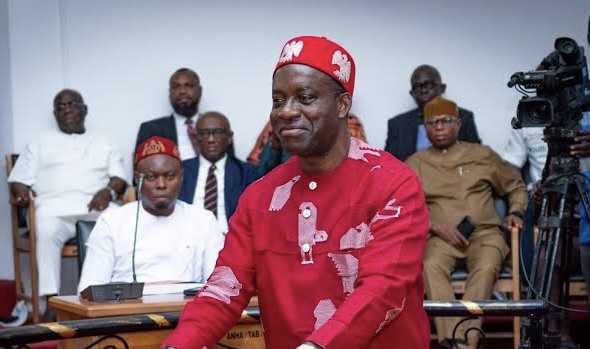Mixed reactions have trailed the suspension of a traditional ruler of an Anambra community and the threat to others by the state government over the conferment of chieftaincy titles on some individuals during the yuletide.
On Thursday, residents blamed the traditional rulers for their woes, while others said the government was overbearing.

The Anambra government on January 8, through the Ministry of Local Government, Chieftaincy and Community Affairs, suspended Igwe Damian Ezeani of Neni for conferring chieftaincy title on Ifeanyi Ubah.
The government, which accused the ruler of not complying with the provisions of the Traditional Ruler Code of Conduct (2020), also threatened to sanction those who abused the process.
Sam Okeke, a lecturer at the faculty of law, Nnamdi Azikiwe University, Awka, said if there was a law which says the state should know about any conferment of chieftaincy titles, the government was right in its actions.
Mr Okeke said, however, it was unfortunate that such a law existed in the first place because it was the prerogative of traditional rulers to decide who to confer titles on and that it should not be a matter for the government.
He described it as a jamboree, a situation where traditional rulers confer titles on as many as 30 people on one occasion without clear criteria or proof of how the beneficiary impacted the people’s welfare and the community’s infrastructure development.
“I do not think it is fair to dethrone or suspend a traditional ruler for conferring chieftaincy titles on people. It amounts to restricting their rights and privileges. The law can not be actually very justifiable. It actually should not be there in the first place because it affects their image natively,” he said.
Rommy Ezeonwuka, the founder of Ogilisi Foundation, an Igbo socio-cultural organisation, said traditional rulers deserved better treatment in the hands of the government for the collective image of the Igbo people.
Mr Ezeonwuka said even though some traditional rulers erred in their actions, they should not be sacked as students in a classroom as had been the case in recent times, but the government should instead set up a panel of inquiry.
He said it was reprehensible for any traditional ruler to confer chieftaincy title for personal interest and monetary gains. But anyone who had contributed to the development of his community was entitled to a chieftaincy title.
Mr Ezeonwuka added, “The government gives them vehicles and pays them salaries; they depend on the government, so they should be under government control. They should have set up an inquiry made up of people with good knowledge of tradition, not politicians.
“These people will look at the issues and advise the government appropriately and help the government play safe. The threat and sack of Igbo traditional rulers is not good for the dignity of the stools and image of the people.”
The Ikemba Front, a political pressure group, said singling out a traditional ruler for conferring a chieftaincy title on Mr Ubah, who had indicated interest in contesting the 2025 governorship election, was a show of political desperation by Soludo.
Arinze Awogu, the group’s national coordinator, condemned the “selective justice” meted out to Mr Ezeani and, by extension, Ubah, noting that at least 177 eminent personalities were conferred with chieftaincy titles during the yuletide and New Year celebrations by 21 rulers across Anambra.
“We wondered why Igwe Damian Ezeani should be singled out for vilification and witch-hunting. We challenge the government to publish clearance letters issued in favour of all the recipients of chieftaincy titles, showing that they complied with section 2 C of the Anambra State Traditional Rulers Law,” he stated.
(NAN)







